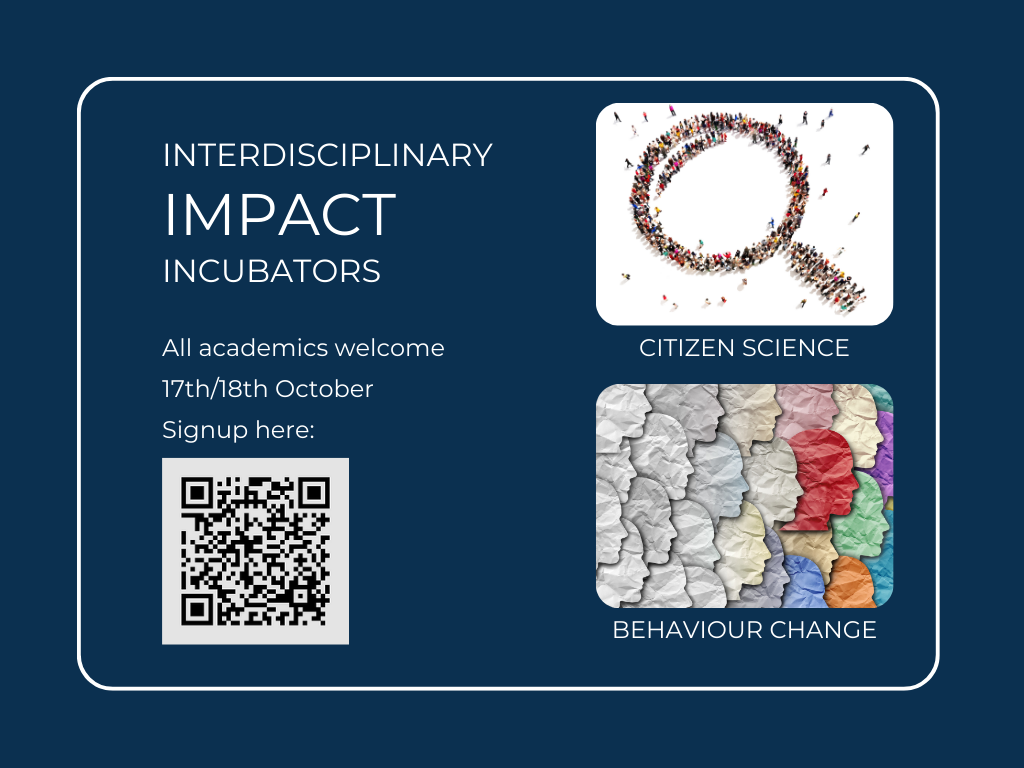The Research Impact team are delivering interdisciplinary impact “incubator” sessions, designed to bring colleagues together around a theme and discuss their impact journeys. This piece reflects on the first two sessions, which are held in addition to the School-based sessions supported by the team.
“Ever to Excel”, the St Andrews motto, derives from the sixth book of Homer’s Iliad. The quotation continues “… to do better than others, and to bring glory to your forebears, who indeed were very great… this is my ancestry…”
The University of St Andrews is no stranger to excellence. To excel, institutions, policies and those who create and implement the same, must be subject to change. As a world-leading research hub, we encourage researchers to collaborate between subject groups. Supporting our community to excel, we call for an increased awareness of the possibility and advantages of interdisciplinary research and impact.
To promote interdisciplinary work, the Research Impact team organised two interdisciplinary impact incubator sessions in late 2023, collecting the academic community to share ideas across disciplines. The sessions focused on citizen science and behaviour change skills.

Citizen science extends the way we typically view science in a research context. It encourages researchers and citizens to think beyond a laboratory environment and compare different interpretations of data by active participation from citizens. This method dismantles some of the barriers that restrict the public from participating in academia and produces results which include the wider community.
The impact incubator on citizen science was attended by special guest Dr Alison Johnston, a Reader in Statistics and Director of the Centre for Research into Ecological and Environmental Modelling (CREEM). Dr Johnston’s research forms a critical part of the popular citizen science website eBird. This platform welcomes birdwatchers to share their specific and distinctive knowledge of birdwatching. It allows users to keep track of the birds sighted and notifies them of more sightings in their area. It is an information dense, state-of-the art platform that brings the birdwatching community together, which has been built on the tenets of citizen science.
Researchers and PhD students spoke of the importance of human-centric design when generating projects that involve individuals and communities, placing people at the centre of research. There was a consensus that citizen involvement and community co-creation were better suited names for citizen science as a method. Dr. Johnston provided valuable insights into how she conducts research with citizen involvement, sharing her experience of working with communities across the globe to create a dense database of bird sightings in real-time.
PhD researchers Annah McCurry and Maria Andrei ideated how this method could be applied to their projects. Annah’s project involves a self-updating database of resources for those who have experienced domestic violence. Maria’s project applies citizen data in an assessment of how virtual museums succeed. Professor Josep Call from the School of Psychology and Neuroscience, who studies the evolution of cognitive psychology with a special focus on animals solving problems, spoke of the necessity of streamlining data collection so that errors which may negatively impact results are minimized. Dr Johnston shared insights into how these errors could be reduced. Ellen Thompson, the Head of Outreach at the Laidlaw Music Centre and Dr Anne- Marie Weijmans, co-founder of Shine (a collaboration between the School of Physics and Astronomy and the Music Centre, that uses music to explain scientific concepts) compared ways to recruit individuals effectively for different citizen science projects, and spoke of their experiences going to schools and working with children.
The session on citizen science laid the groundwork for the conversations on behaviour change and impact. Colleagues from across the University discussed how research can lead to behaviour change, and how researchers can measure the success of change, whether qualitatively or quantitatively. They explored how they could bridge the distance between individuals and situations of urgency, often illuminated by research, like climate change. The importance of governmental co-operation was emphasized as a driver of impact, yet reduced confidence in government organisations was also mentioned as a barrier. Ideas on how individuals can be effectively “nudged” by technology and emotive language emerged as an ongoing discussion.
After two sessions, researchers had made and strong new connections across Schools, leaving with both more clarity on novel forms of research impact, and more questions to explore together.
These sessions were the first in a series organised by the Research Impact team. Dates and details of future interdisciplinary incubators, and the format of School-based sessions, can be found here.

